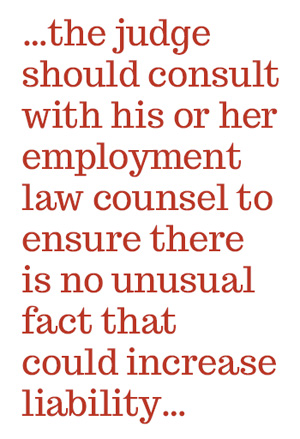Martin has been working as a probation officer for seventeen years during which time he provided good to commendable service to the court. He and Judge Edwards have seen a lot together and are very comfortable with each other. However, lately all is not well with Martin, and no one knows exactly what or why. Martin has been making errors that are unlike him.
His co-worker, Sandra, believes that more than once she has smelled alcohol when Martin returned from lunch. The Chief Probation Officer also found Martin asleep at his desk one afternoon. When he woke him, Martin said he had been ill the night before and had eaten too much for lunch. He told Martin that he should stay home if he was ill but he could not sleep at his desk.
Three months after the sleeping incident another employee told the chief that Martin seemed to be slurring his words and his eyes look glassy. Martin had neither reported a disability nor requested any accommodation. What are the options for the Chief Probation Officer and Judge Edwards?
One option not available for the chief is to keep this information about Martin away from the judge. Each court should clearly establish with the appropriate employees the personnel information that must be shared with the judge. At a minimum, the chief should provide to the judge information about any significant violation of expected work behavior and significant unusual occurrence.
Sleeping on the job is both a significant violation of expected work behavior and an unusual occurrence. The chief should have informed Judge Edwards immediately about the sleeping incident. It is too late if the information is shared with the judge only after Martin is impaired on the job.
 Courts simply cannot tolerate an employee who is drinking—or impaired by any substance—on the job. Martin displayed evidence of a number of possible medical conditions, but his behavior could also be evidence of drinking on the job.
Courts simply cannot tolerate an employee who is drinking—or impaired by any substance—on the job. Martin displayed evidence of a number of possible medical conditions, but his behavior could also be evidence of drinking on the job.
The Americans with Disabilities Act protects employees’ privacy and generally prohibits employers from making inquiries into an employee’s health. However, there is an exception to that prohibition when the disability or impairment is obvious. The employer may note what has been observed and may ask the employee if there is a need for accommodation. This approach works for a problem that can be resolved with something as simple as equipment, such as noticing that an employee seems to have difficulty reading from a computer screen. It does not work as well for Martin’s potential problem, whether it is alcoholism, psychiatric or medical.
Judge Edwards can suggest to Martin that he get evaluated for a medical condition, but it is up to Martin whether he does so or not. The court must be concerned with security; and an appearance of unprofessionalism and possible conflict of interest, may or may not allow for an accommodation.
Judge Edwards does have options available to protect the court and the community. If the judge believes that Martin has been drinking on the job, the best option is for Judge Edwards, with the chief as a witness, to confront Martin.
If Martin denies drinking, but the judge and the chief continue to believe that Martin is either drunk or impaired by drugs, they can require Martin to submit to a drug test. If he refuses a drug test, Judge Edwards may fire Martin. This would not be true for all entities, but probation officers serve at the will and pleasure of the Court. The judge must have trust in the officer’s honesty and judgment, which would be in question if the probation officer refuses to submit to a drug test.
Martin may deny that he is impaired due to alcohol and drugs. Judge Edwards should decide how to proceed by weighing the need for Martin’s service, his overall work quality, and his work history. Just as important, the Court must consider how these types of situations have been handled historically. If this is the first situation of this sort, Judge Edwards will be setting a precedent and needs to consider what he would do if it was not Martin, but one of his other employees.
If Martin admits to being impaired on the job, Judge Edwards could terminate Martin’s employment. The Judicial Code of Conduct seeks to maintain integrity, independence and impartiality. Given the impact that alcoholism plays in the lives of many probationers coming before the court, it is fair to say that Martin’s integrity, independence and impartiality would be impaired by his current struggles.
It would be a reasonable and appropriate option for Judge Edwards to terminate Martin’s employment. However, the judge should consult with his or her employment law counsel to ensure there is no unusual fact that could increase liability to the judge and to the county. The judge may ultimately decide to take a hard line in order to ensure the integrity of the court and to send a clear message to employees and probationers.
While some judges will decide that termination of employment is the correct option, others may want to give Martin a chance for treatment and rehabilitation. This is also a reasonable and appropriate option. If Martin remains employed, Judge Edwards will have to take steps to ensure that Martin’s work is not compromised. He may, and should, require Martin to get treatment and sign releases for the treatment provider to furnish Judge Edwards with information about his progress and compliance.
Normally an employer cannot require an employee to give a release that allows the employer to get this type of information from a health care provider. However, Martin has essentially lost his rights under federal law by drinking on the job. It has become a disciplinary issue and is not an issue about Martin’s disability and his need for accommodation.
If Martin is allowed to continue in the job, Judge Edwards should draw up a written agreement that at a minimum requires Martin to:
- get an assessment by a professional;
- comply with the recommendations of the professional; and,
- authorize the professional to give complete information about Martin’s interaction with the professional to Judge Edwards.
Martin may be required to undergo detoxification and in-house treatment for a period of time. Judge Edwards may give Martin a Family & Medical Leave approval for that treatment; but, Martin does not have a right to Family & Medical Leave under these circumstances. Compassion coupled with accountability could result in a happy ending for both employee and employer.
Martin does not have rights under the Family & Medical Leave Act and the Americans with Disabilities Act because of his use of alcohol on the job. Before Martin was confronted with the suspicion of drinking on the job, he could have self-reported his addiction problem. Judge Edwards’ options would have been different.
Martin’s addiction is considered a disability. He has a right to request a leave for treatment for his disability. Martin could have exercised his rights, under both the Americans with Disabilities Act and the Family & Medical Leave Act, if he had asked for a leave before he was held accountable for his impairment. The Americans with Disabilities Act specifically provides that persons who are alcoholics, or who are currently engaging in the illegal use of drugs, may be held to the same performance and conduct standards as all other employees. No law requires the employer to tolerate substance abuse in the workplace.
Courts as employers have many fact-sensitive legal problems associated with an employee who may or may not have an addiction problem, or who may or may not be disabled. The scenarios given in this article are rather simple, and yet, the choices were not easy. In reality, one additional fact could cause different legal results.
There is one more thing Judge Edwards needs to do, regardless of the option he wishes to take—call and consult with the employment law attorney, sparing no details. The right actions ensure a better functioning workplace with minimal legal liability. The wrong actions could cause the court to be saddled with a poorly performing employee and/or high legal liability to the judge and the county. Be wary and give me a call!
 If a judge needs assistance or advice about these matters, contact Brenda Rodeheffer at 317-234-3936 or
If a judge needs assistance or advice about these matters, contact Brenda Rodeheffer at 317-234-3936 or